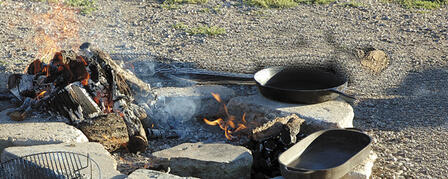MAKE SAFETY AN OUTDOOR RECREATION PRIORITY

Safe Kids Kansas offers families important outdoor safety tips
TOPEKA — Sleeping bag? Check. Hiking boots? Check. Safety guidelines? While the preparations for a family camping, boating, or hiking trip usually include a review of the necessary gear, parents should also review safety guidelines with their children, paying special attention to potential hazards specific to outdoor recreation.
Campfires, portable stoves, heaters, and fuel-burning lanterns all produce carbon monoxide (CO), a colorless and odorless gas that can poison a child very quickly. About 30 campers each year die of CO poisoning in the U.S. Never use any of these devices in an enclosed area, even a tent. In addition, make sure these devices — as well as campfires — are clear of flammable material, from paper napkins to dry grass.
Safe Kids Kansas recommends these safety guidelines around campfires and portable heating devices:
- keep matches and lighters out of the reach of children;
- always supervise children near a campfire or portable stove; and
- keep a bucket of water and a shovel near the fire at all times and extinguish the fire completely before going to sleep or leaving the site.
In addition, when camping and hiking keep these guidelines in mind:
- keep first aid supplies and emergency phone numbers handy and know where the nearest land-line phone is located;
- let friends and relatives know where you are going and when you are coming home;
- never let children hike alone;
- dress children in layers of clothing to help prevent heat-related illness and hypothermia;
- do not push kids to go on a longer or more strenuous hike than they can handle;
- use SPF 15 or higher sunscreen when outside;
- bring plenty of drinking water or sports drinks and high-energy snacks; and
- wear hiking boots and clothing that offers protection from scrapes and poisonous plants, as well as insect repellent.
Everyone loves the water in summer, so safety measures are in order here, too. Follow these guidelines whether wading, swimming, or boating:
- always supervise young children near water;
- insist that everyone wear personal flotation devices on boats;
- small children should wear PFDs whenever near open bodies of water;
- when boating, be able to recognize buoy markings and know how to use proper navigation lights;
- make sure boats have current safety inspections; and
- do not overload boats.
For more information about outdoor recreation safety, call 785-296-1223 or visit www.usa.safekids.org.
-30-







